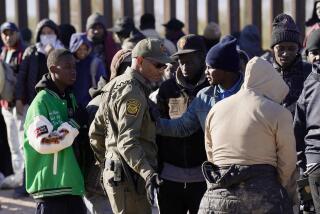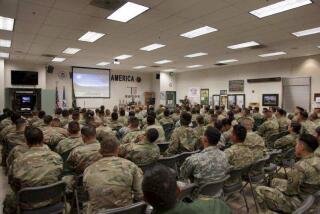Governors warn of troop buildup’s impact on Guard
WASHINGTON — Republican and Democratic governors meeting here Saturday warned that President Bush’s “surge” of additional troops to Iraq would put added pressure on National Guard units already stretched to their limits.
“We the governors rely on the Guard to respond to natural disasters, a pandemic or terrorist attack,” said North Carolina Gov. Michael F. Easley, a Democrat. “Currently, we don’t have the manpower or the equipment to perform that dual role” of responding to both state and federal needs.
The Pentagon last week announced plans to send 14,000 National Guard members to Iraq next year as support for the 21,500 troops to be deployed under Bush’s plan. The announcement came on the heels of a change in Pentagon policy to deploy Guard troops more frequently but to limit tours to a year; the average now is 18 months.
Minnesota Gov. Tim Pawlenty, a Republican, said the federal government must follow through on its pledge to replace equipment taken by Guard troops to Iraq.
“Those promises need to be kept,” Pawlenty said. “We’ll be able to test that, because we have a significant number coming back this summer. We’ll be able to see if the equipment comes back.”
The governors’ willingness to challenge the buildup reflects overall impatience with Washington, which has inspired a slew of state initiatives to tackle such issues as global warming, energy efficiency and healthcare.
Eighty-eight percent of stateside Army National Guard units are “very poorly equipped,” with less than half of what they need to respond to a domestic crisis, Lt. Gen. H. Steven Blum testified a few weeks ago to the independent Commission on the National Guard and Reserves.
Blum, chief of the National Guard Bureau, coordinates between the states and the Pentagon.
He said 45% of Air National Guard units lacked the necessary equipment to deploy.
Last month, National Guard officials notified commanders in Arkansas, Indiana, Oklahoma and Ohio that their combat brigades -- each about 3,500 strong -- might be the first to return to Iraq under the new guidelines, redeploying between January and July of next year. All four states sent troops to Afghanistan and Iraq in 2004. Under the old rules, Oklahoma was not scheduled to be called on again until 2010; the other three states, 2009.
In interviews, National Guard officials in Arkansas, Indiana and Oklahoma said their units were short on rifles and other basic equipment.
“We are hurting in equipment nationally, Guard-wide,” said Lt. Col. Deedra Thombleson of the Indiana National Guard.
Governors, in town for a National Governors Assn. meeting, plan to raise the issue Monday at a White House session with Bush. Guard officials plan to talk to Defense Secretary Robert M. Gates about it Tuesday.
“We will do all that we can to support the effort, but getting the equipment to do that will be a challenge,” said Maj. Gen. Roger Lempke, head of the Nebraska National Guard and president of the Adjutants General Assn. of the United States.
Equipping the Guard is of particular concern in states such as California and Florida, where troops are routinely called to respond to natural disasters like hurricanes and forest fires.
“We want to protect our troops and make sure they have what they need to deal with natural disasters,” said Florida Gov. Charlie Crist, a Republican.
Gov. Easley of North Carolina called National Guard equipment levels across the country “putridly inadequate.”
And without adequate equipment, he said, the National Guard’s role in the buildup would amount to “a squandered mobilization.”
With plans to increase the frequency of Guard deployments -- now once every six years -- North Dakota Gov. John Hoeven, a Republican, said that getting enough troops for a second rotation in Iraq was “a concern.”
The governors association president, Arizona Gov. Janet Napolitano, a Democrat who has advocated sending National Guard troops to secure the U.S.-Mexico border, said the Guard was “being stretched” to respond to the buildup.
California Gov. Arnold Schwarzenegger, a Republican, is reviewing the plans with his National Guard leadership to assess the impact on the state. He has advocated doing what’s necessary to ensure success in Iraq but said he would not support a policy jeopardizing California’s safety.
molly.hennessy-fiske @latimes.com
More to Read
Sign up for Essential California
The most important California stories and recommendations in your inbox every morning.
You may occasionally receive promotional content from the Los Angeles Times.











